Tampilkan postingan dengan label Festivals. Tampilkan semua postingan
Tampilkan postingan dengan label Festivals. Tampilkan semua postingan
Poonam Pandey Promoting Holi without Water
Posted by bambang
Posted on 21.48
with No comments
Label:
Festivals
How to catch all the fish in a lake within 15 minutes
Posted by bambang
Posted on 23.09
with No comments
Just beneath the village of Bamba, in the Northern part of Dogon country in Mali, lies a small, yet sacred lake, where fishing is permitted only once a year – during the unique ritual called Antogo.

In the past, Bamba is said to have been covered in lush green forests. The lake, which is considered to be sacred and populated with good spirits, used to offer tons of fish that contributed to local food requirements. But with changes in climate, desertification, and the passage of time, the region gradually became dry, infertile and inhospitable. The locals now face huge problems such as unavailability of water, but the lake still represents a precious resource to the local Dogons, but one which they exhaust every year during Antogo. The event is held on the 6th month of the dry season, generally in May, but the exact date is fixed each year by the council of wise men. Saturdays are market days in Bamba, and for the first three market days of the month wooden sticks are placed in the middle of the lake, acting as a signal, a warning that the ritual is getting closer. On the day that is finally designated as the day of Antogo, hundreds gather from all parts of Mali around Bamba’s lake. The 3 biggest groups are formed by the most respected and ancient families of various Dogon villages. The group from Bamba itself is usually the largest. These groups of people maintain a collective mystical silence, except for the wise who recite incantations and praise deities. When they are done speaking, the ritual itself – and all the magic associated with it – begins.

he children and men form a frame of sorts around the lake; women are prohibited from participating in the ritual as they are considered impure because of their menstrual cycles. Once the frame is formed, they wait and watch, until the tinkling of a bell and a gunshot is heard. Then, hundreds of Dogon jump wildly into the lake, armed with fishing baskets, attempting to catch as many fish as possible, as fast as they can. The caught fish are quickly stashed into local leather bags, but sometimes people keep them in their mouths until they can find a place for storage. The Dogons soon become unrecognizable, covered completely in mud. The dance continues, nevertheless, and the fishing quickly turns into a frenzy. All this goes on for about 15 minutes, when a gunshot marks the end of the ritual. All the captured fish are put together and handed over to the oldest man of Bamba, the village elder, who will make sure the catch is properly distributed among the villages.














Label:
Festivals,
Powerful Fish
The Weird Sport of Goose Pulling
Posted by bambang
Posted on 10.25
with No comments
Goose pulling is an old sport originally played in parts of the Netherlands, Belgium, England and North America from the 17th to the 19th centuries. The sport involves a goose that is hung by its legs from a pole or rope that is stretched across a road. A man riding on horseback at a full gallop would attempt to grab the bird by the neck in order to pull the head off. Whoever makes off with the head is declared winner and becomes the noble hero of the day. Goose pulling is still practiced today, in parts of Belgium and in Grevenbicht in the Netherlands as part of Shrove Tuesday and in some towns in Germany as part of the Shrove Monday celebrations.
During the old days a live goose was used. To make the sport challenging, the goose's neck was generously oiled to make it difficult to retain a grip on it, and the bird's constant fluttering and flailing made it difficult to target it in the first place. Sometimes "a nigger” with a long whip in hand was stationed near the target who would harass the horse as he passed by.
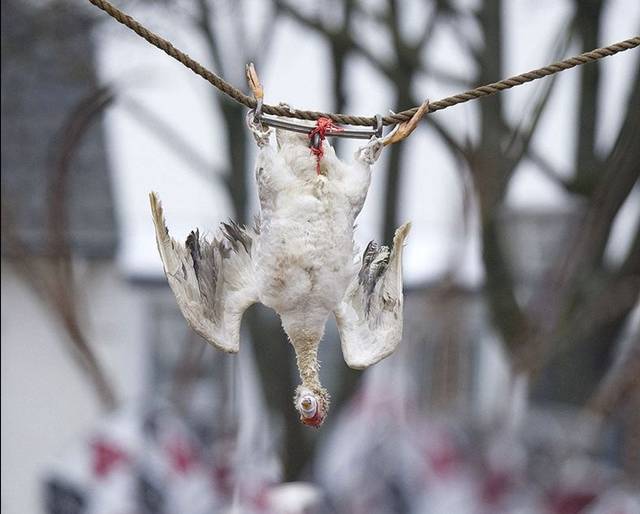
The prizes of a goose-pulling contest were trivial – often the dead bird itself, other times contributions from the audience or rounds of drinks. The main draw of such contests for the spectators was the betting on the competitors, sometimes for money or more often for alcoholic drinks.
Today, instead of live geese, dead ones are used, but that doesn’t make the sport any less brutal. Even during the old days when animal brutality were common, goose pulling was often frowned upon and sometimes compared to the barbarous practice of bull-fighting.
Goose pulling largely died out in the United States after the Civil War, though it was still occasionally practiced in parts of the South as late as the 1870s. However, in Grevenbicht in the Netherlands and in parts of Belgium and Germany, goose pulling – using a dead goose that has been humanely killed by a veterinarian – continues to this day as part of traditional Shrove Tuesday celebrations. It is referred to as Ganstrekken in the Netherlands, Gansrijden in Belgium and Gänsereiten in Germany. Although the use of live geese was banned in the 1920s, the practice still arouses some controversy. In 2008 the Dutch Party for Animals (PvdD) proposed that it should be banned. The organizers rejected the proposal, pointing out that there was no question of cruelty to animals because the geese were already dead.
Belgian goose pulling is accompanied by an elaborate set of customs. The rider who succeeds in pulling off the goose's head is "crowned" as the "king" for one year and given a crown and mantle. At the end of his "king year" the ruling king has to treat his "subjects" to a feast of beer, drinks, cigars and bread pudding or sausages held either at his home or at a local pub. The kings compete with each other to become the "emperor".

Goose pulling in 19th-century West Virginia

Photo — Link
Goose pulling in Belgium.
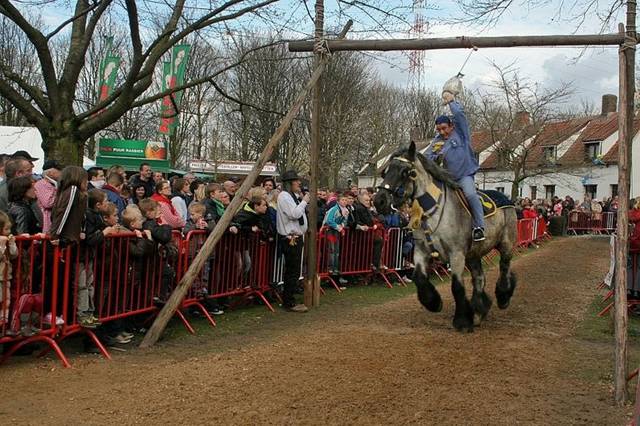
Photo — Link
Goose pulling in Antwerp, Belgium.
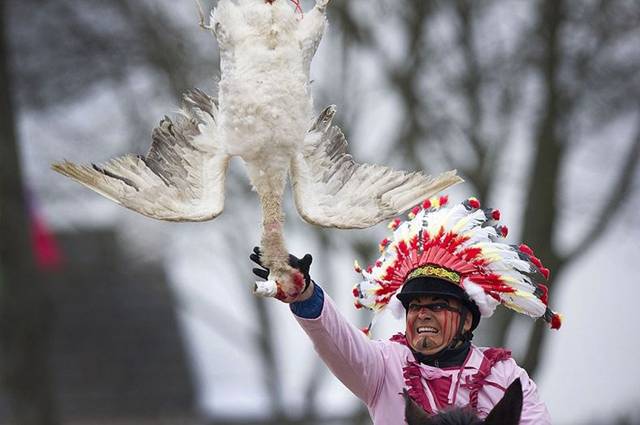
Goose pulling in Grevenbicht, the Netherland.
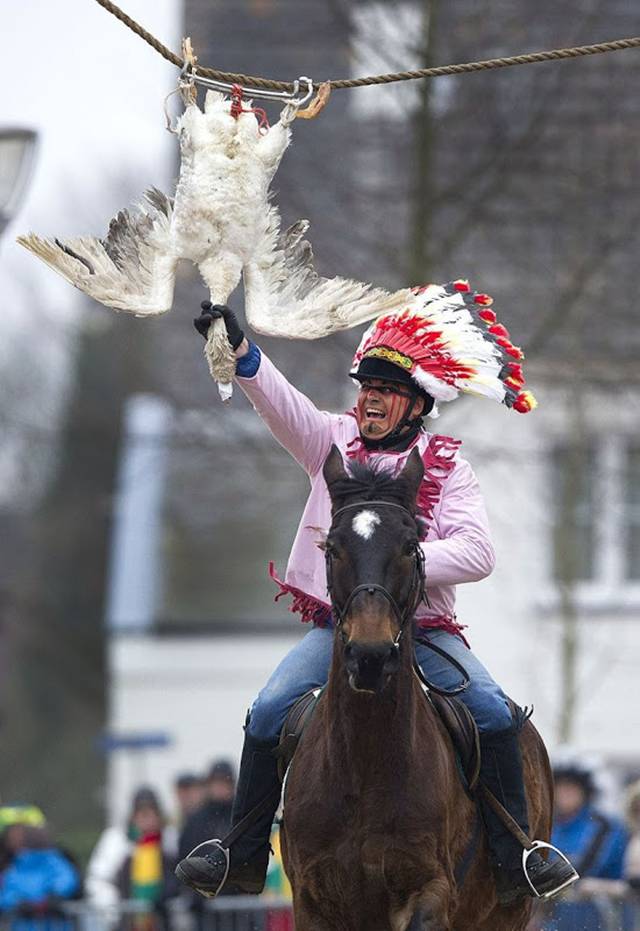
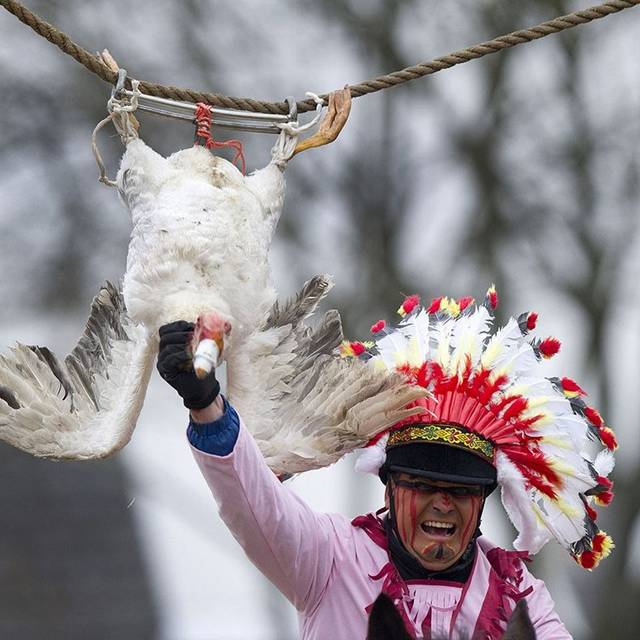
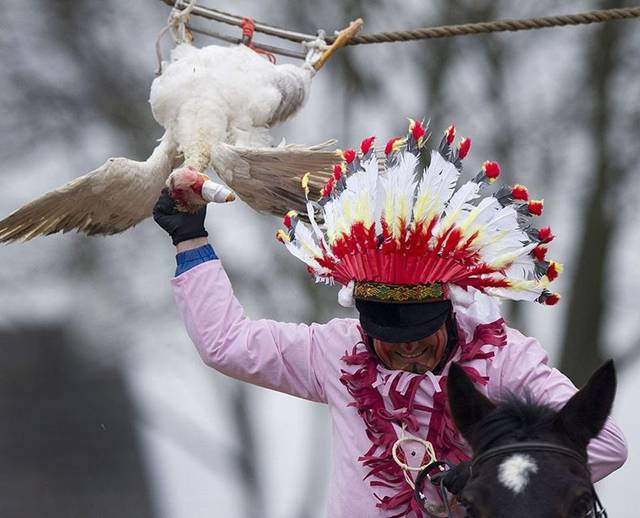


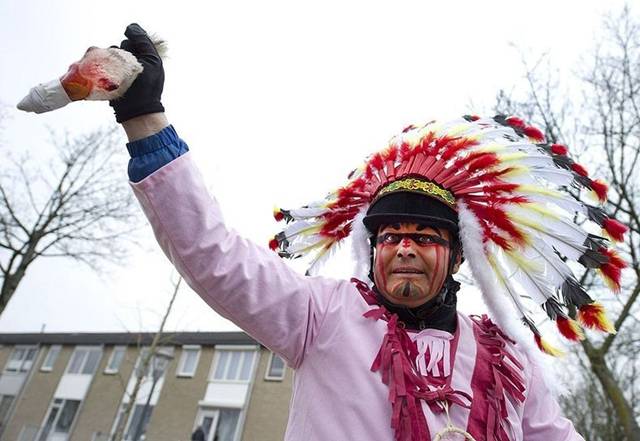
Label:
Amazing Animals,
Festivals,
Sports
Carnival in Rio de Janeiro the final Stretch
Posted by bambang
Posted on 10.04
with No comments




Photo — Link
The globe’s biggest Carnival bash opened Friday, when Rio de Janeiro’s mayor handed the key to the city to rotund King Momo, the mythical jester figure who reigns over Carnival. About 850,000 tourists are expected in Rio during the raucous, five-day free-for-all. Millions of people across the country will take to the streets and sambadromes to dance and party, effectively putting Brazil on a week-long hiatus.
The Vila Isabel samba school was crowned champion of the 2013 Rio Carnival on Wednesday for its parade highlighting Brazil's agricultural might as "the world's breadbasket." In a feverishly awaited verdict, a 40-member jury gave the Rio school, considered a cradle of samba music in Brazil, the third title of its 65-year-old history. Vila Isabel received 299.7 points, edging the popular Beija-Flor with 299.4 and sparking scenes of jubilation at its northern Rio headquarters.

The 40 judges gave their verdict based on choreography, music, dancing and creativity.
With its 3800 dancers and seven giant fantasy floats, Vila Isabel was the last of 12 elite samba schools to dazzle a capacity crowd early Tuesday at the 72,000-seat Sambodrome, the parade ground designed by the late star architect Oscar Niemeyer. With music composed by several popular sambistas, including Arlindo Cruz and 75-year-old composer Martinho da Vila, the school portrayed the simple customs of country people, their music, processions and festivals.





Last year, the Unidos da Tijuca school won the title, with its tribute to the late singer and composer Louis Gonzaga, the "king of Baiao," a popular music style from Brazil's northeast.The Sambodrome parades marked the climax of the pre-Lent bacchanalian Carnival festival, a national holiday celebrated throughout this huge and racially diverse country of 194 million people. Some six million people, including 900,000 tourists, are believed to have attended the five-day Rio extravaganza, which began Friday. Hailed as "the greatest show on Earth," the Rio Carnival also featured hundreds of street bashes marked by wild samba dancing and heavy beer consumption.


























Label:
Festivals,
World's Biggest,
Worlds Biggest










.jpg)




.jpg)
